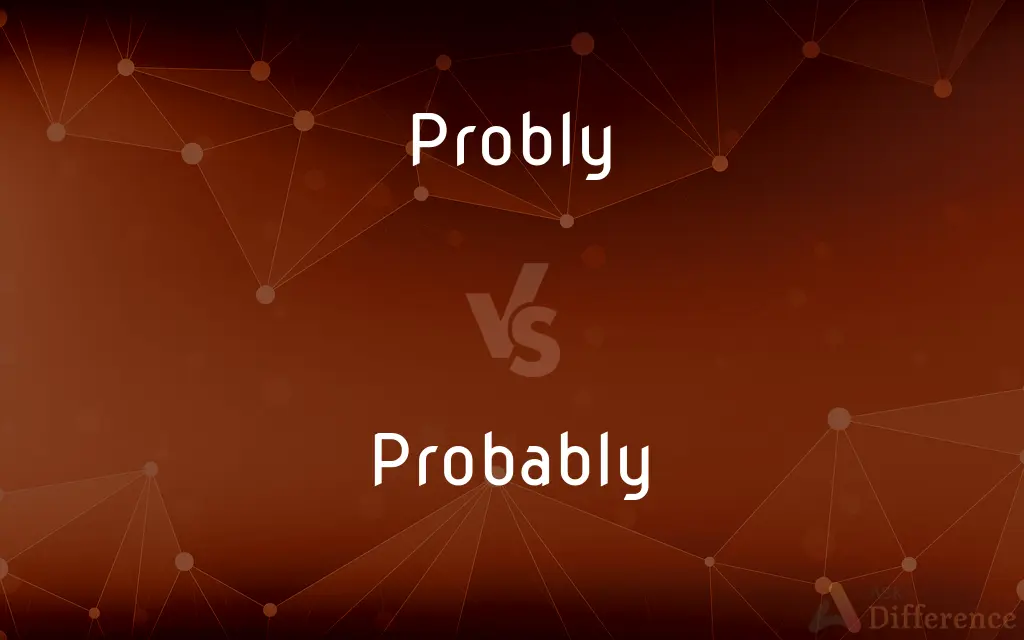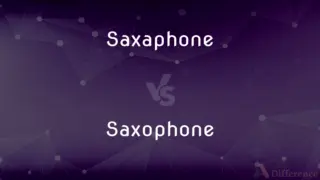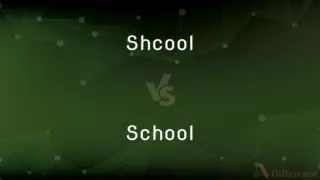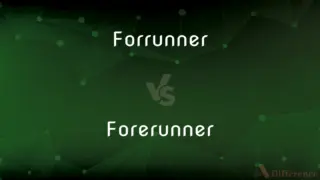Probly vs. Probably — Which is Correct Spelling?
Edited by Tayyaba Rehman — By Fiza Rafique — Updated on March 29, 2024
"Probly" is an incorrect spelling, while "probably" is the correct adverb suggesting that something is likely to happen or be true.

Table of Contents
Which is correct: Probly or Probably
How to spell Probably?

Probly
Incorrect Spelling

Probably
Correct Spelling
ADVERTISEMENT
Key Differences
Think of the base word "probable" and add "ly".
Associate "probably" with common phrases, like "most probably" or "probably not".
Note the absence of "a" in "probly", which makes it incorrect.
Remember "prob" and the sound "ab-ly" to form "probably".
Visualize "probably" as a combination of "prob" and "ably".
ADVERTISEMENT
How Do You Spell Probably Correctly?
Incorrect: She can probly answer your question.
Correct: She can probably answer your question.
Incorrect: It will probly rain later today.
Correct: It will probably rain later today.
Incorrect: I'll probly go to the party tonight.
Correct: I'll probably go to the party tonight.
Incorrect: They're probly the best team in the league.
Correct: They're probably the best team in the league.
Incorrect: He probly forgot about the meeting.
Correct: He probably forgot about the meeting.
Probably Definitions
Denoting the strongest possibility from known options.
He's probably the best choice for captain.
Indicating likelihood or high chance of an event.
It will probably rain tomorrow.
Expressing a tentative assumption.
That's probably the best solution.
Used to suggest uncertainty.
She's probably at home now.
Signifying probability without certainty.
The package will probably arrive next week.
Most likely; presumably.
In all likelihood.
In a probable manner; in likelihood.
Distinguish between what may possibly and what will probably be done.
With considerable certainty; without much doubt;
He is probably out of the country
In all likelihood we are headed for war
Easy to believe on the basis of available evidence;
He talked plausibly before the committee
He will probably win the election
Probably Meaning in a Sentence
He'll probably arrive in about an hour.
I'll probably need a jacket; it looks cold outside.
She's probably the smartest person I know.
They're probably going to win the championship.
You can probably find it at the grocery store.
It's probably too late to call them now.
That movie is probably the best one I've seen this year.
She's probably waiting for us at the restaurant.
We should probably start heading back home.
It's probably a good idea to apologize.
The test was probably harder than I expected.
I'll probably just have a salad for lunch.
He probably knows what he's doing.
I probably shouldn't have eaten so much cake.
You're probably right about needing reservations.
That's probably the reason they were so upset.
It's probably not worth worrying about too much.
I probably need to charge my phone soon.
She probably didn't mean to hurt your feelings.
We'll probably see more changes in the next few years.
The book is probably in my backpack.
I probably won't be able to make it to the party.
It's probably safer to take the main road.
It will probably take a few days to fix.
They probably just forgot to send the invitation.
Probably Idioms & Phrases
Probably not
A polite way to express doubt or negation.
I can ask, but it's probably not going to happen.
More than probably
Very likely.
She's more than probably the top candidate for the job.
Probably the most
Indicating something is the maximum or most likely scenario.
He's probably the most qualified person for the position.
Probably the best
A way to suggest something is superior without making an absolute statement.
This is probably the best coffee in town.
It's probably worth
Suggesting that an action or effort is likely to be beneficial.
It's probably worth checking the details before we proceed.
Probably better off
Suggesting that an alternative action or condition is more advantageous.
You're probably better off taking the train during rush hour.
Probably the case
Used to agree or confirm that a situation is likely true.
It's probably the case that we'll need more time to finish.
Probably so
Agreeing that something is likely true.
Do you think it'll rain? Probably so, given the clouds.
As probably expected
Indicating that the outcome was likely anticipated.
The event was canceled, as probably expected due to the weather.
Probably the least
Suggesting something is the minimum or least likely scenario.
That's probably the least of our worries right now.
Common Curiosities
What is the verb form of probably?
"Probably" does not have a verb form as it's an adverb.
What is the pronunciation of probably?
It is pronounced as /ˈprɑː.bə.bli/.
What is the singular form of probably?
"Probably" does not have a singular or plural form as it's an adverb.
Which preposition is used with probably?
There isn't a specific preposition exclusively paired with "probably". Various prepositions can precede or follow it based on context.
Which conjunction is used with probably?
Any conjunction can be used with "probably" based on sentence structure, such as "and", "or", or "but".
What is the root word of probably?
The root word is "probable".
Is probably an abstract noun?
No, "probably" is not an abstract noun.
What is the plural form of probably?
"Probably" does not have a plural form.
Is probably a noun or adjective?
Neither. "Probably" is an adverb.
Is probably a negative or positive word?
"Probably" is neutral but can indicate positive or negative outcomes based on context.
Why is it called probably?
It's called "probably" because it's derived from the adjective "probable", meaning likely to happen, with the suffix "-ly".
Which vowel is used before probably?
No specific vowel is consistently used before "probably"; it depends on the sentence's context.
Is probably a collective noun?
No, "probably" is not a collective noun.
How do we divide probably into syllables?
It can be divided as: prob-a-bly.
Is probably a vowel or consonant?
"Probably" is a word comprising both vowels and consonants.
Is probably a countable noun?
No, "probably" is not a noun, and thus, not countable.
How many syllables are in probably?
There are three syllables in "probably".
What is the first form of probably?
"Probably" does not have verb forms as it's an adverb.
What is the second form of probably?
"Probably" does not have verb forms.
Which article is used with probably?
"Probably" does not typically pair with an article.
Which determiner is used with probably?
"Probably" doesn't typically use a determiner.
Is the probably term a metaphor?
No, "probably" is not used as a metaphor.
Is the word probably imperative?
No, "probably" is not imperative.
What is the opposite of probably?
The opposite of "probably" is "improbably" or "unlikely".
Is probably an adverb?
Yes, "probably" is an adverb.
What is a stressed syllable in probably?
The first syllable "prob" is stressed.
What part of speech is probably?
"Probably" is an adverb.
What is another term for probably?
Another term for "probably" is "likely".
What is the third form of probably?
"Probably" does not have verb forms.
How is probably used in a sentence?
Example: You probably know the answer better than I do.
Share Your Discovery

Previous Comparison
Saxaphone vs. Saxophone
Next Comparison
Shcool vs. SchoolAuthor Spotlight
Written by
Fiza RafiqueFiza Rafique is a skilled content writer at AskDifference.com, where she meticulously refines and enhances written pieces. Drawing from her vast editorial expertise, Fiza ensures clarity, accuracy, and precision in every article. Passionate about language, she continually seeks to elevate the quality of content for readers worldwide.
Edited by
Tayyaba RehmanTayyaba Rehman is a distinguished writer, currently serving as a primary contributor to askdifference.com. As a researcher in semantics and etymology, Tayyaba's passion for the complexity of languages and their distinctions has found a perfect home on the platform. Tayyaba delves into the intricacies of language, distinguishing between commonly confused words and phrases, thereby providing clarity for readers worldwide.






































